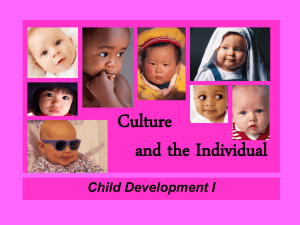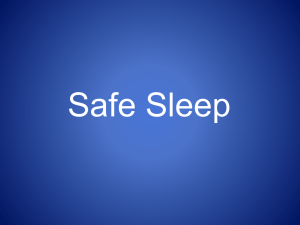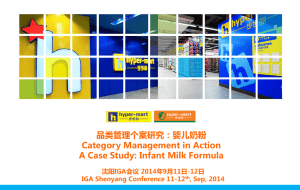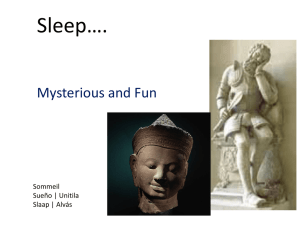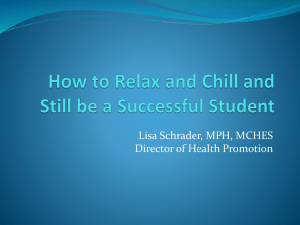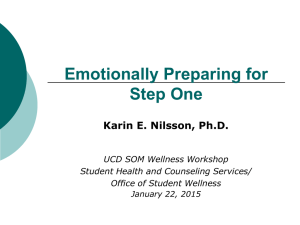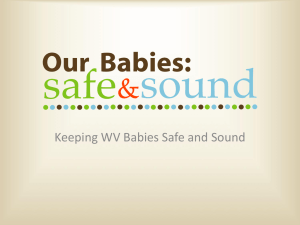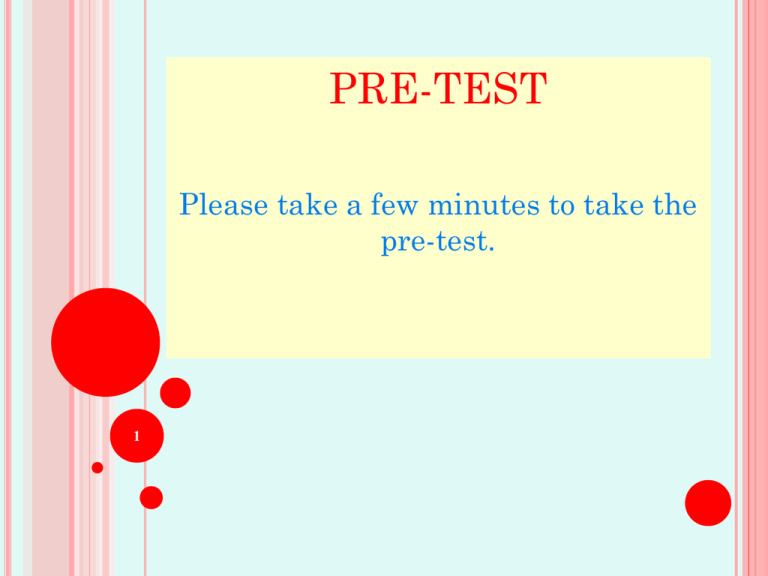
PRE-TEST
SAFE BEGINNINGS
Please
take a few minutes
to take
A PREVENTION
PROGRAM
FOR the
SACRAMENTOpre-test.
COUNTY TO REDUCE
INFANT SLEEP-RELATED DEATHS
IN CHILDREN AGES 0-5
1
TEST REVIEW
QUESTIONS?
2
95 Infant Sleep Related Deaths in
Sacramento County from 2007-2011
Almost all (90 of the 95 deaths) had at least one known
infant sleep environmental risk factor:
3
SAFE BEGINNINGS COLLABORATIVE
FOCUS GROUPS
Parent Response
What do you know about
infant sleep-related deaths?
… they are a completely
natural phenomenon.
…believe parents have little
ability to prevent these
deaths
…agreed Infant sleep-related
deaths are a major problem
…heard of infant sleeprelated deaths on TV, but
not within their
families/communities
Provider Response
What do you think are the
major risk factors for infant
sleep-related deaths?
Co-sleeping
Infant sleeping somewhere
other than a crib
Infant sleeping on their
tummy
4
Sacramento County parent and service providers focus group
participants overwhelmingly agreed:
An education campaign to raise awareness of the importance of
infants (particularly those 6 months of age and younger)
sleeping in safe environments was needed for Sacramento
County.
With information delivered by:
Birthing Hospitals
Health Care Professionals
Child Care Providers
Family Resource Centers
Community Programs
5
ABC’S OF INFANT SAFE SLEEPING VIDEO
6
SACRAMENTO COUNTY
ABC’S OF INFANT SAFE SLEEPING
A for Alone
Babies should always sleep alone in their own crib or
bassinette.
Co-sleeping with other children or even parents can be
dangerous – others in bed with your baby can
accidentally suffocate them by simply lying too close to
their mouth or nose, or by rolling onto them while
asleep.
Your baby should not sleep with stuffed animals,
pillows or blankets — these soft items could
accidentally fall over your baby’s face and suffocate
them.
A blanket sleeper or sleep sack is enough to keep your
baby comfortable.
7
SACRAMENTO COUNTY –
ABC’S OF INFANT SAFE SLEEPING
B for Back
Babies who sleep on their backs are much less likely to die of
infant sleep-related deaths.
According to doctors, “back sleeping” will not increase a baby’s
risk of choking.
Many of our own mothers and grandmothers were taught to put
a baby on their tummy to sleep — so you’ll need to gently
remind them that to prevent infant sleep-related deaths, it’s
“back to sleep.”
8
SACRAMENTO COUNTY –
ABC’S OF INFANT SAFE SLEEPING
C for Crib
Cribs and bassinets are the safest places for
babies to sleep – as long as you keep them safe!
To make breastfeeding easier keep a crib or
bassinet next to your bed and always put your
baby back to sleep afterwards.
Cribs should be free of pillows, bumpers,
stuffed toys, extra blankets or anything that
could accidentally cover your babies face and
suffocate them. A blanket sleeper or sleep sack
is sufficient.
Make sure that the crib mattress is firm and fits
snuggly with no space between the mattress
and the side of the crib, where the baby could
become trapped.
Unlike firm crib mattresses, today’s adult beds
are soft and can cause babies to suffocate.
9
INFANT SLEEP-RELATED DEATHS:
A QUICK AND SILENT KILLER
Infant sleep-related deaths are the leading cause of death
for babies one month to one year of age.
Most babies that have an infant sleep-related death appear
to be healthy prior to death.
Infant sleep-related deaths occur in all socio-economic,
racial and ethnic groups. African American and Native
American babies are 2-3 times more likely than Caucasian
babies to have an infant sleep-related death.
10
www.firstcandle.org
TRIPLE RISK MODEL
Critical
Development
Period (2-4
months)
Vulnerable
Infant
SIDS
Infant SleepRelated Deaths
Sleep
Environment
Risk Factors
11
INFANT SAFE SLEEPING
Recent research from the American Academy of Pediatrics
indicates that infant sleep-related deaths can be prevented
by implementing safe sleeping techniques for every nap and
every night.
Recommendations for sleep position and environment
should be used consistently for infants up to 1 year of age.
12
AMERICAN ACADEMY OF PEDIATRICS
ESTABLISHED RISK FACTORS PART 1:
Maternal
smoking
during pregnancy
Young
Late
maternal age
or no prenatal care
Male
sex
African
Native
American
American
Maternal
drinking and
/or drug use
SIDS and Other Sleep-Related Infant Deaths: Expansion of Recommendations for a Safe Infant
Sleeping Environment; Pediatrics Journal, October 2011
13
AMERICAN ACADEMY OF PEDIATRICS
ESTABLISHED SLEEP ENVIRONMENT
RISK FACTORS & RECOMMENDATIONS:
Room-sharing without bed-sharing is recommended.
Risk Factor: Co-Sleeping
14
AMERICAN ACADEMY OF PEDIATRICS
ESTABLISHED SLEEP ENVIRONMENT
RISK FACTORS & RECOMMENDATIONS:
Recommendation: Back to sleep always, for every sleep.
Risk Factor: Sleeping on stomach or on side.
15
AMERICAN ACADEMY OF PEDIATRICS
ESTABLISHED SLEEP ENVIRONMENT
RISK FACTORS & RECOMMENDATIONS:
Recommendation:
Keep soft
objects out of the
cribSleep Surface
Recommendation:
Firm
Risk Factor: Soft sleep surface
(adult bed, couch or pillow)
16
AMERICAN ACADEMY OF PEDIATRICS
ESTABLISHED SLEEP ENVIRONMENT
RISK FACTORS & RECOMMENDATIONS:
Recommendation:
Recommendation: No more than one more
Infantlayer
clothing
that
than
an
adult
would
wear
to
be
Risk Factor: Overheating
is designed to keepcomfortable.
infants warm
without possible
head covering or
entrapment (such
as loose blankets).
17
AMERICAN ACADEMY OF PEDIATRICS
INFANT SAFE SLEEPING 2011 RECOMMENDATIONS
Recommendation: Supervised tummy-time
while awake…
…beginning at as early of an age as possible,
to promote motor development.
18
AMERICAN ACADEMY OF PEDIATRICS
INFANT SAFE SLEEPING 2011 RECOMMENDATIONS
Recommendation:
Put your baby back
into his or
her own
Breastfeeding
lowers
the risk
crib to sleep after feeding.
19
AMERICAN ACADEMY OF PEDIATRICS
INFANT SAFE SLEEPING 2011 RECOMMENDATIONS
When
If you are breastbreastfeeding,
wait
Recommendation:
feeding consult
3-4 weeks
to
Consider
offering
a
your lactation
introduce
the at
clean,
dry pacifier
consultant
pacifier
until
the
nap and
bedtime,
and/or your
baby
hasnot
a good
but do
force it.
doctor.
latch.
20
POST-TEST
Please take a few minutes to take
the post-test.
21
MEDICAL RESOURCES
If you do not have health insurance or a primary care provider,
please contact your local Family Resource Center for more
information on the Medi-Cal program.
Or Contact:
Medi-Cal Fresh Service Center
(916) 874-3100
https://www.mybenefitscalwin.org/
TDD/TTY, Hearing Impaired (916) 874-2599
Services provided by the Medi-CalFresh Service Center are for
cases managed by Sacramento County only.
22
SACRAMENTO COUNTY
FAMILY RESOURCE CENTERS
La Familia Counseling Center
5523 34th Street
Sacramento, CA 95820
(916) 452-3601
The Effort Resource Center
6015 Watt Avenue, Suite 2
North Highlands, CA 95660
(916) 679-3925
North Sacramento Family Resource Center
1217 Del Paso Blvd.
Sacramento, CA 95815
(916) 679-3743
The Firehouse - Mutual Assistance Network
810 Grand Avenue
Sacramento, CA 95838
(916) 567-9567
Folsom Cordova Community Partnership
10665 Coloma Rd., Suite 200
Rancho Cordova, CA 95670
(916) 361-8684
Meadowview Family Resource Center
2251 Florin Road, Suite 158
Sacramento, CA 95822
(916) 394-6300
River Oak Family Resource Center
4322 4th Avenue
Sacramento, CA 95817
(916) 244-5800
Valley Hi Family Resource Center
7000 Franklin Blvd., Suite 820
Sacramento, CA 95823
(916) 290-8281
23
ACCESSING RESOURCES
Child Abuse Prevention Center
www.thecapcenter.org
Sacramento County WIC offices
http://www.dhhs.saccounty.net/PRI/WIC/Pages/Women-Infants-andChildren-Home.aspx
First Candle
www.firstcandle.org
American Academy of Pediatrics
www.aap.org
Halo Sleep Sack
www.halosleep.com
24
EVALUATIONS
Are there any other questions?
Please take a minute and fill out the evaluation.
Thank you!!
Becky Honig, M.S.
(916) 244-1938
bhonig@thecapcenter.org
25


